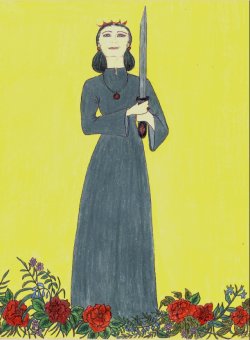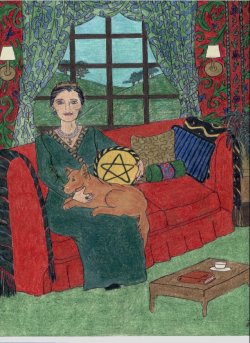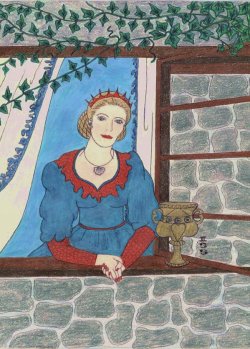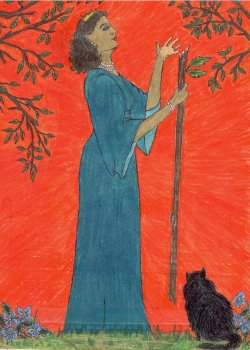

The role of women in both the early Christian church houses and in modern Christianity is too often overlooked. Jesus had initiated a revolutionary spiritual practice when he and his apostles taught God's law to women , a practice forbidden by the Rabbis of their time. It is estimated that 13,000,000 women are the backbone of the present Christian church in the United States and biblical sources support the huge role women played in the spread of Christianity and in the building of the first churches. Women have never forgotten that the reason you go to church or participate in a spiritual community is because there is someone there who needs you.
In Canada, eighty-four percent of people say they believe in God, sixty-six percent say they are Christian but only twenty percent attend church. Some churches have marginalized themselves with their own moral elitism - the "God loves you but I'm his favourite" school of Christianity. In so doing, they have lost their position as a cornerstone of the community and as a valid mediator in the individual's relationship with God. These churches need to seriously reconsider where they think the centre is. While many versions of Christian and Non-Christian churches have women priests, deacons, and lay ministers, other more patriarchal churches, both Christian and Non-Christian, have continued to deny women access to positions of influence within the church hierarchy while continuing to rely on their unconditional and largely unacknowledged support.
We are all sadly aware of the scandals which are rocking the Roman Catholic church and other Christian churches. It is hard to discern who to be more angry at - the pedophiles or the heirarchy that preserved, tolerated, accommodated and permitted them to continue their rape of children's souls, minds and bodies. In the Roman Catholic church a priest is considered to be another Christ - let that thought sink in for a minute - another moral outrage committed under the auspices of Christ's name. There is now significant need for this church to address the issue of celibacy, married priests and women in the clergy. I could only imagine how many good nuns and former nuns there are out there who would make good shepherds if given the opportunity.
In the early Christian church women were both apostles and deacons - active and vital members of the spiritual community - and, of course, formidable advocates of spreading of the Word. "Tell a woman" is still the best way to get information out. In the Rider-Waite deck the Queen of Cups is depicted holding a cyborium - a eucharistic vessel used during Holy Communion - it is thought by some to allude to the role of women as clergy in the early church, capable of offering Sacraments and having the gifts of spirit. By New Testament standards, apostles were given by God and had many diverse roles: workers of miracles, witnesses who proclaimed Christ's resurrection, founders and leaders of churches, preachers, teachers, disciples, and financial managers of the church. I would like to introduce you to some of the women apostles as archetypes for the Queens of Tarot.
Phoebe, The Queen of Swords: Woman with a Spiritual Mission
 The name Phoebe means "bright" or "radiant". Apollo and Diana, the god and goddess of the sun and moon , were also called "Phoebos" and "Phoebe". Many converted Christians retained their names derived from the old gods because the names no longer held religious significance to them. Phoebe was a Diakonos of the Church at Chenchreae, the eastern seaport of the city of Corinth. Corinth was on a narrow isthmus that connected southern Greece (the Peleponessus) with northern Greece and the mainland of Europe. Diakanos is a Greek word that originally meant "someone who is responsible for, attends to, ministers to, or waits on a person or group of persons or a task or area of responsibility." We learn about Phoebe in Paul's Letter to the Romans Chapter 16:1,2 (KJV)
The name Phoebe means "bright" or "radiant". Apollo and Diana, the god and goddess of the sun and moon , were also called "Phoebos" and "Phoebe". Many converted Christians retained their names derived from the old gods because the names no longer held religious significance to them. Phoebe was a Diakonos of the Church at Chenchreae, the eastern seaport of the city of Corinth. Corinth was on a narrow isthmus that connected southern Greece (the Peleponessus) with northern Greece and the mainland of Europe. Diakanos is a Greek word that originally meant "someone who is responsible for, attends to, ministers to, or waits on a person or group of persons or a task or area of responsibility." We learn about Phoebe in Paul's Letter to the Romans Chapter 16:1,2 (KJV)
"I commend unto you Phebe our sister, which is a servant of the church which is at Cenchrea. That ye receive her in the Lord, as becometh saints, and that ye assist her in whatsoever business she hath need of you: for she hath been a succourer of many, and of myself also."
Phoebe is obviously a woman he trusted enough to carry his message to the church at Rome. She was doing important work for the church to receive such a high commendation and is noted as a woman who gave care and comfort to many, including the apostles. We can discern this from the way the instruction was given to the church at Rome. They were commanded to "receive her in the Lord" - in a religious manner and with religious motives. She was to be accorded whatever assistance she required. The expression "as becometh saints" would apply to both the reception the church was to give and the high quality of the reception Phoebe was entitled to receive based on her good work.
It is felt by some scholars that Phoebe was a widow as it would have been most unusual, according to Greek custom, for her to be travelling alone or acting in such an independent manner if she had a living spouse or even if she was not married.
Junia, The Queen of Coins: Woman Full of Grace, Outstanding Among the Apostles
 We meet Junia in Romans 16:7 (KJV) "Salute Andronicus and Junia, my kinsmen, and my fellow prisoners, who are of note among the apostles, who also were in Christ before me."
We meet Junia in Romans 16:7 (KJV) "Salute Andronicus and Junia, my kinsmen, and my fellow prisoners, who are of note among the apostles, who also were in Christ before me."
We can assume that the apostles Junia and Andronicus had great authority in the early Christian community. They were probably missionaries and church founders. Their apostleship had begun with a vision of the resurrected Christ and the charge to become apostles of Christ. Their conversion goes back to the time of Stephen so they had links to the earliest church in Jerusalem. True apostles were the ones - some 500 and the original 12 - who saw Jesus in his 'forty days' of ascension.
It is probably safe to assume that Junia had some association with Christ prior to his resurrection. She is believed to have been a Palestinian Christian. Junia and Andronicus may have been among the seventy-two Galilean missonaries mentioned in Luke 10:1-24 (KJV). One could also speculate that Junia and her husband were among those persecuted in Jerusalem by Paul before his conversion to Christianity. It is, therefore, also possible that their involvement in his life was an aspect of his conversion. Paul states that they had been imprisoned together although there are no specific details. Paul was imprisoned many times for his preaching. They were certainly in Rome when Paul wrote the Letter to the Romans which was delivered by Phoebe.
Most information available on Junia is a debate on whether Junia is male or female and if they were truly apostles or just really well liked by them. Up until the 13th Century religious scholars referred to Junia as a woman and viewed her as a well respected apostle.
Lydia, The Queen of Cups: Woman of the Opened Heart
 "And on the sabbath we went out of the city by a river side, where prayer was wont to be made; and we sat down, and spake unto women which resorted hither. And a certain woman named Lydia, a seller of purple, of the city of Thyatira, which worshipped God, heard us: whose heart the Lord opened, that she attended unto the things which were spoken of Paul. And when she was baptized, and her household, she besought us, saying, If ye have judged me to be faithful to the Lord, come into my house and abide there. And she constrained us."Acts 16:13-15 (KJV)
"And on the sabbath we went out of the city by a river side, where prayer was wont to be made; and we sat down, and spake unto women which resorted hither. And a certain woman named Lydia, a seller of purple, of the city of Thyatira, which worshipped God, heard us: whose heart the Lord opened, that she attended unto the things which were spoken of Paul. And when she was baptized, and her household, she besought us, saying, If ye have judged me to be faithful to the Lord, come into my house and abide there. And she constrained us."Acts 16:13-15 (KJV)
The Apostle Paul was on his second missionary journey when he travelled to Phiippi in Macedonia to preach the gospel. It was here that he met Lydia from the city of Thyatira. Thyatira was in an area that Paul had been forbidden to enter. Lydia became Paul's first European convert and the first European baptized.
Lydia was an entrepeneur who dealt in scarlet and purple-dyed goods. The purple dye, made from a certain type of mollusk (purpura murex), was extremely expensive. It was used for the stripes in the togas of Roman senators. She had relocated her business from Thyatira to a major thoroughfare on the Gangas River in Philippi and supplied textiles to both the Romans and the Persians. It was Lydia's customers who imprisoned Paul and Silas.
Lydia was a religious woman, a proselyte of the Hebrew faith, who gathered with other women for prayer but was still lost. Proselytes were pagans who accepted the ethical monotheism of Judaism and attended synagogue, but who did not feel obligated to keep the whole Jewish law. They did worship the only true God and did so with specific acts.
One sabbath Paul and his followers left the city to preach by a river. It was there that the Lord opened her heart. She and her household were baptized, and she invited Paul and his other companions, to make her house their church in Philippi. From this humble beginning, this church grew and became an active Christian community, evangelizing, sharing its resources and sending their own people to aid Paul in his work and when he was imprisoned. Paul returned to this church on three different occasions.
Dorcas, The Queen of Wands: Woman of the Resurrected Spirit
 Dorcas or Tabitha (both names mean "gazelle" - her name was Zibiah in Hebrew) is introduced to us in Acts 9:36-40 (KJV). She was a disciple or mathetria from Joppa, a seacoast town of Israel, now Jaffa on the Mediterranean Coast of Palestine, and home of one of the early Christian communities.
Dorcas or Tabitha (both names mean "gazelle" - her name was Zibiah in Hebrew) is introduced to us in Acts 9:36-40 (KJV). She was a disciple or mathetria from Joppa, a seacoast town of Israel, now Jaffa on the Mediterranean Coast of Palestine, and home of one of the early Christian communities.
"Now there was in Joppa a certain disciple named Tabitha, which by interpretation was called Dorcas; this woman was full of good works and almsdeeds which she did. And it came to pass in those days, that she was sick, and died; whom when they had washed, they laid her in an upper chamber. And forasmuch as Lydda was nigh to Joppa, and the disciples had heard that Peter was there, they sent unto him two men, desiring him that he would not delay to come to them. Then Peter arose and went with them. When he was come, they brought him into the upper chamber: and all the widows stood by him weeping, and shewing the coats and garments which Dorcas made, while she was with them. But Peter put them all forth, and kneeled down and prayed; and turning him to the body said, Tabitha, arise. And she opened her eyes and when she saw Peter she sat up." Acts 9:36-40
Almsdeeds is one translation of a word that can also mean compassionateness. Dorcas did not come from a wealthy background, she made her living as a seamstress, Her faith was strong and she wished to live her life by the rule "Love one another" so she sewed clothes for widows and orphans in her community as well as tending to the sick. She was loved for her acts of charity. When she became ill and died, her community was distraught and the Apostle Peter was sent for. He brought her back to life. This was Peter's first resurrection. His words to her, "Tabitha, kumi," (Tabitha, arise), are nearly identical to the words of Jesus in Mark 5:41 when he brought the daughter of Jairus back to life, "Talitha, kumi," (little girl, arise). Jesus took Jairus daughter by the hand before he spoke to her, showing no fear of becoming ceremonially defiled, and Peter did the same thing for Dorcas as she awoke.
Word of this miracle spread quickly and Peter stayed in Joppa for several days after performing this miracle. He took the opportunity to stablize this whole community of new converts. Often faith found through miracles alone was not enough to hold a spiritual community together.
Closing
There are a many more women involved in the Early Christian church other than Phoebe, Junia, Dorcas and Lydia. All of these remarkable women deserve to be recognized for their original committment to accept Christ's teaching and "Love one another." They risked martyrdom for their beliefs and for the opening of their hearts and homes. It is a shame that the church they built with such love, courage and devotion is on its knees - or maybe that is where it was supposed to be all the time.


